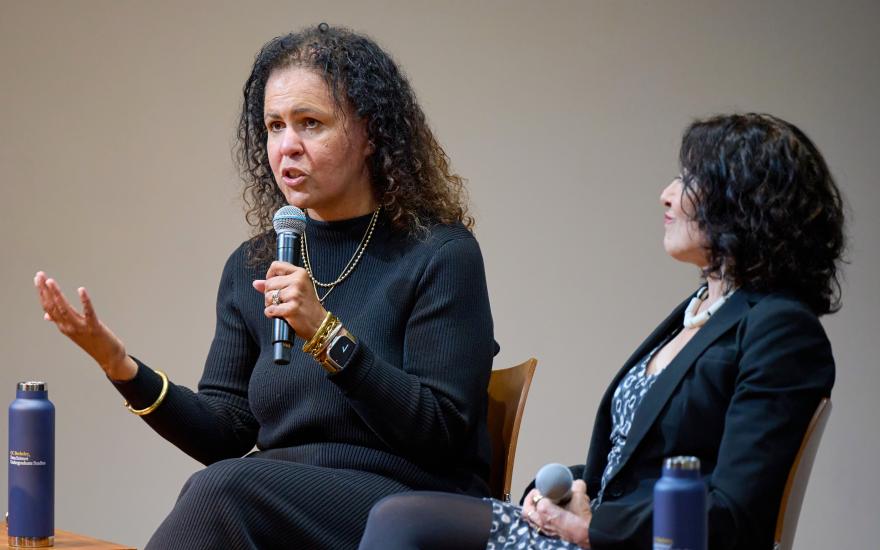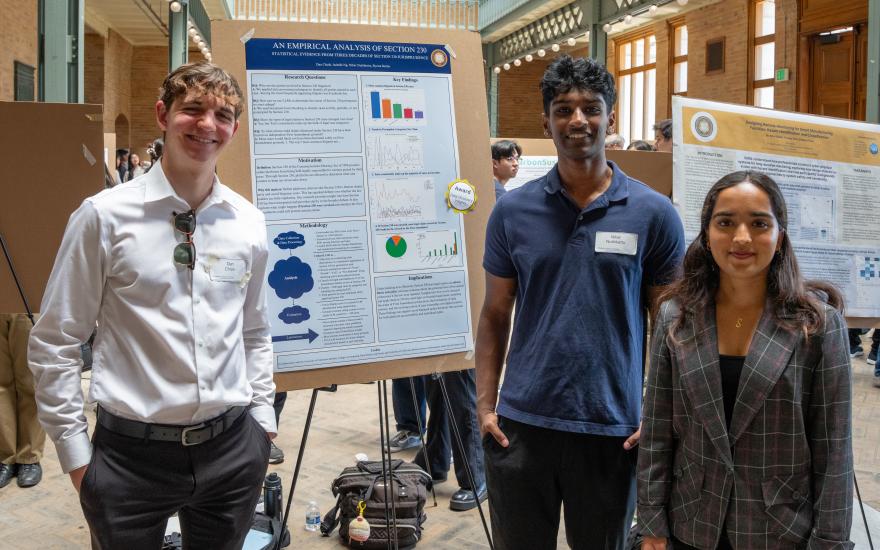Isabel Serrano knew what she enjoyed – the logic of math, the patterns of data, the power to help people through medicine – but for years she didn’t know how to make it a career. When an intern advisor proposed a PhD in computational biology, it clicked almost instantly.
Serrano, who received her undergraduate degree from California State University, Fullerton, now helps increase awareness of this field for other CSU students. She also helps mentor and prepare them for the same ambitious path she took to study at UC Berkeley’s Center for Computational Biology.
“We have presences at conferences every year. But if you’re already at these events, then you probably know what a PhD is. You have some sense of what comp bio is,” said Serrano, who will complete her PhD this spring. “What about the people who don’t – not because they’re not interested, but because they don’t have the language to figure out that this might be what they're interested in?”
Serrano started working with CSUs to give back to that community and to help others find out about the nascent interdisciplinary field of computational biology. Efforts like her outreach initiative could also help diversify STEM.
Only 30% of scholars who earned science, math, engineering or technology PhDs in 2020 were from underrepresented backgrounds, according to a National Center for Science and Engineering Statistics report. Working with California state universities, which awards more than half of all bachelor’s degrees earned by California’s Latinx, African American and Native American students combined, could help prepare diverse students to enter STEM PhD programs.
The Center for Computational Biology is part of Berkeley’s College of Computing, Data Science, and Society (CDSS). Established in 2023, CDSS is the first new college at the university in more than 50 years.
Finding the language to envision her future
Serrano always loved math. She’d get caught up in the process of breaking a complex problem down into smaller solvable pieces and then building it back up into one solution.
So when she went to Fullerton, she knew that would be her major. But she wasn’t sure what she could do with it. Her main idea was to become a math teacher at a high school, which she thought she’d enjoy. It was also one of the only options she thought she had. She wished she wanted to be a medical student because she saw how medicine can help society.
Exploration during college in classes, internships and even movies gave her new language to identify and pursue what she wanted. She found that she could apply math to solve biomedical questions, and she could use statistical modeling and machine learning to understand DNA. Once she came to Berkeley, she learned her interests intersected with another field she’d never heard of: data science.
Today, Serrano uses math and computation to understand what changes occur within our DNA, why they happen, what the impact is, and how that does or doesn’t differ across different populations. Her work is centered in basic science. She hopes to support the development of more efficient, effective, innovative and equitable drug treatments in the future.
“I'm really interested in understanding how things kind of break down and why they break down and specifically how this leads to disease,” Serrano said. She added, “There are a lot of underrepresented populations in biology, so I’m also interested in how that impacts the scientific conclusions that we're getting.”
Giving back to her community
As Serrano deepened her understanding of and mission for her career, she knew she wanted to give back to her community. She’d seen the power of small kindnesses and relationships modeled for her growing up, from the sharing of a job opening to the support her grandparents received when they immigrated to the United States.
She’d benefited from and contributed to her community at CSU Fullerton. Now at Berkeley, she saw these kinds of relationships, too. Advisors were dedicated to supporting their students. Professors took time to help students who weren’t their advisees. And students shared with each other about their divergent research areas.
So Serrano looked at her own life. Where could she help? That’s when she decided to begin outreach with CSUs. Starting two and a half years ago, Serrano and a handful of Center for Computational Biology graduate students began traveling to these state universities each year to expand awareness of PhDs and this field.
Their efforts look different at each institution, depending on what the university needs, Serrano said. Sometimes it’s broad information sessions or seminars for students. Other times they help faculty support students with their goals. And they continue these partnerships, returning to campuses year after year to build on initial foundations.
Serrano is now interviewing for postdoctoral positions where she hopes to deepen her research skills. After that, she wants to join a university where she can teach, mentor and support research for the next generation of computational biology students – a path that finally brings all her passions together, continues her pay-it-forward approach and builds on what’s been modeled for her.
“Mentors really shape and empower students and what they can do,” said Serrano. “I've been really fortunate to have great mentors. I think that’s partially what drew me to Berkeley is seeing a lot of really great professors and being like, ‘I feel like I trust you. I can grow with you. I can learn from you.’"



